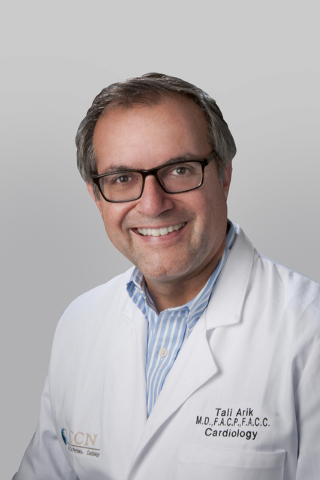
According to one local cardiologist, the percentage of heart attacks and strokes in the American population over the last 30 years has declined significantly, thanks to better lifestyle management and medications.
Dr. Tali Arik, a cardiologist with HealthCare Partners of Nevada, said a decrease in the number of people smoking, better diet and exercise and more widespread use of medications has played a part in the reduced number of per population occurrences of cardiovascular issues.
“In the last 30 years so much has happened in cardiology in terms of treatment. But the biggest contribution isn’t the stenting and the advanced procedures. Studies have looked at the contributions of procedures versus intervention with medication and lifestyle changes, which show about two-thirds or more of that improvement is due to medication and life-style changes,” he explained.
Better control of the population’s blood pressure and cholesterol through medication has played a large role in decreasing the number of heart attacks and strokes as well, the cardiologist said.
“(Blood pressure medication) has had the most significant effect on the drastic decrease in the risk of stroke. Blood pressure and stroke and blood pressure and smoking are intimately related. If you have a significant decrease in both smoking and blood pressure, you’ll see sort of a synergistic affect in terms of decreasing the frequency of stroke. And frankly I can say anecdotally in my own experience I don’t see patients having the old-style major stokes anymore,” he said. “And the evidence is overwhelming that treating cholesterol with medication decreases the risk of heart attack and stroke. The evidence is overwhelming that lower cholesterol is better and that treating even people who feel well is better than no treatment for cholesterol. The medicines work.”
Although lowering cholesterol can be done in a number of ways, the best medicinal way, Arik said, was through the use of statins.
“What we’ve learned is that it matters how you lower your medication. Some medications that lower your cholesterol don’t lower your risk for heart attacks and stroke. Those medications are really no longer considered useful, they’re prescribed much less frequently by doctors. The medicines that have stood the test of time are the statins. Those lower cholesterol while also lowering a person’s risk for heart attack and stroke,” he said.
One of the biggest lifestyle changes he says has made an impact on patients’ health is the choice to stop smoking.
According to Arik, the number of Americans smoking has declined from more than 50 percent 50 years ago to around 15 percent today. And while some wonder whether quitting smoking in their later years will really do anything to improve their health, Arik says stopping at any age can improve a person’s quality of life.
“Someone who smokes as a young person and quits at age 40 can gain potentially seven to 10 years of life. But even a 60-year-old is going to gain extra years. And on top of that what I counsel patients is to stop worrying about how long you’re going to live because another important consideration is what your life is going to look like while you’re alive. Do you want to be engaging in behaviors that are going to require you to get a lot of medical care, to go to doctors with high frequency, spend a lot of time in and out of the hospital and spend a lot of money on medication? So it’s not just about longevity, that’s not the only parameter of wellness, the absence of ill health is also really important too,” he said.
Having a healthier diet and engaging in more exercise has also shown to improve patients’ heart health as well, Arik said.
“How important is diet and how important is exercise? They’re both critically important. One can possibly make the case that they are more important that any medication,” he said.
The cardiologist said he stresses this information with all of his patients, also adding that making sure they take their medications as prescribed and following up with their doctors are also important steps in maintaining cardiovascular health.